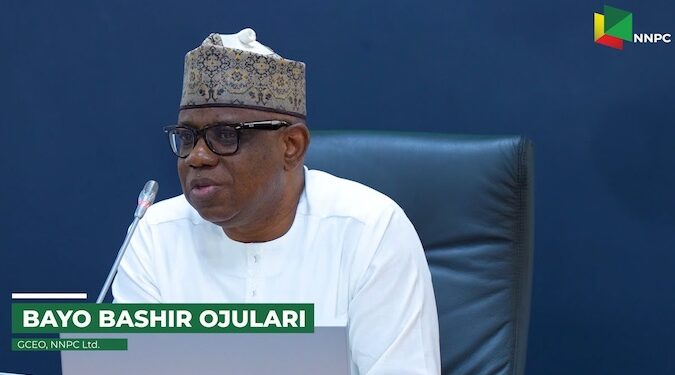Abuja, April 11, 2025 — The Nigerian National Petroleum Company Limited (NNPC) has announced that the $2.8 billion Ajaokuta-Kaduna-Kano (AKK) gas pipeline project has reached 72 per cent completion, marking a major milestone in Nigeria’s gas infrastructure development.
Disclosing this at the 2025 Oloibiri Lecture Series and Energy Forum (OLEF) in Abuja, the Group Chief Executive Officer of NNPC Ltd., Bayo Ojulari, emphasized that the project is key to unlocking Nigeria’s industrial and energy potential. He was represented by NNPC’s Executive Vice President, Upstream, Udobong Ntia.
The AKK pipeline, a 614-kilometre conduit with a 40-inch diameter, is designed to transport natural gas from Ajaokuta in Kogi State through Abuja and Kaduna to Kano. It is a critical part of Nigeria’s broader Trans-Nigeria Gas Pipeline (TNGP) strategy aimed at enhancing electricity generation, revitalizing industries, and reducing environmental harm caused by gas flaring.
“NNPC is transforming into a commercially-driven, innovation-led energy company,” said Ojulari. “Our teams are leveraging real-time reservoir monitoring, AI-driven imaging, and predictive maintenance to future-proof our operations.”
Ojulari underscored that digital transformation, supported by intelligent automation, data governance, and cyber resilience, is central to ensuring Nigeria remains competitive in a low-carbon world.
He reiterated NNPC’s alignment with Nigeria’s Energy Transition Plan, which aims for net-zero emissions by 2060, pointing out that the company has scaled up its autogas programme and is contributing over 1.5GW of installed power capacity to the national grid.
NUPRC Pushes Production Expansion, Regulatory Overhaul
Also speaking at the event, the Chief Executive of the Nigerian Upstream Petroleum Regulatory Commission (NUPRC), Gbenga Komolafe, highlighted Nigeria’s upstream sector expansion. He revealed that about 10 of the recently awarded Petroleum Prospecting Licenses (PPLs) are already operational.
“We are shaping a sustainable and prosperous energy landscape. The NUPRC is not just a regulator—we are business enablers,” Komolafe declared.
The NUPRC has issued 24 priority regulations to streamline operations and is preparing for the 2025 licensing round under a “drill or drop” model. This approach, backed by the Petroleum Industry Act (PIA), is intended to drive investment and operational discipline in the upstream oil and gas sector.
Stakeholders Urge Indigenous Companies to Break ‘Business-as-Usual’ Cycle
Former Petroleum Minister, Don Etiebet, warned that indigenous oil firms taking over assets from International Oil Companies (IOCs) must prioritise sustainable financing, succession planning, and merit-based employment.
“It can’t be business as usual. We must ensure finance and succession strategies are robust to support Nigeria’s energy transition and local capacity development,” he said.
He called for a shift from parochial employment practices to one driven by merit and technical competence, urging stakeholders to ensure that energy development benefits the entire nation.
Energy Sustainability Must Reflect Local Realities — Experts
Chairman of SPE Nigeria, Amina Danmadami, highlighted the unique energy transition path for Nigeria. While the global narrative increasingly centres on renewables, she stressed that oil and gas remain central to Nigeria’s stability.
“In our context, the path to sustainability is not about displacement but optimisation. Technology and policy must go hand in hand to improve productivity and reduce environmental impact,” she said.
She pointed to digital oilfields, AI-based predictive tools, and enhanced recovery techniques as game-changers that can help Nigeria achieve energy resilience.
In a similar vein, Executive Secretary of the Petroleum Technology Development Fund (PTDF), Ahmed Aminu, represented by Ifeoma Nwokike, stressed the critical interplay between policy, technology, and supply chain resilience.
Africa’s Power Gap: An Opportunity for Inclusion
Ojulari also drew attention to the continent’s 600 million people without electricity, describing it as both a development gap and an untapped opportunity for inclusive growth.
Citing data from the International Energy Agency (IEA), he said global energy demand is set to rise by 25% by 2040, driven by industrialisation in Asia and population growth in Africa.
“Nigeria must be ready to meet this demand, not just as an energy exporter, but as a nation able to supply reliable power to its own people and industries,” he said.
Looking Ahead
The 2025 Oloibiri Lecture Series has once again served as a critical platform for dialogue, aligning technology, policy, and business strategy with Nigeria’s energy ambitions. With the AKK pipeline nearing completion and multiple upstream licenses moving into production, industry players agree that Nigeria stands at a pivotal moment in its energy journey.
However, stakeholders continue to stress the need for policy continuity, local capacity building, and infrastructure financing to avoid another cycle of unfulfilled potential.


